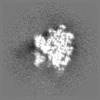[English] 日本語
 Yorodumi
Yorodumi- EMDB-5591: Electron cryo-microscopy of Drosophila melanogaster EF2- and Vig2... -
+ Open data
Open data
- Basic information
Basic information
| Entry | Database: EMDB / ID: EMD-5591 | |||||||||
|---|---|---|---|---|---|---|---|---|---|---|
| Title | Electron cryo-microscopy of Drosophila melanogaster EF2- and Vig2-bound 80S ribosome | |||||||||
 Map data Map data | Reconstruction of D. melanogaster 80S ribosome | |||||||||
 Sample Sample |
| |||||||||
 Keywords Keywords | eukarya eukaryotic ribosomal ribosome 80S protein RNA cryo-electron microscopy protein synthesis mass spectrometry drosophila | |||||||||
| Function / homology |  Function and homology information Function and homology informationPeptide chain elongation / Synthesis of diphthamide-EEF2 / APC/C:Cdc20 mediated degradation of Cyclin B / SCF-beta-TrCP mediated degradation of Emi1 / SRP-dependent cotranslational protein targeting to membrane / Activation of the IkappaB kinase complex, KEY:IRD5 dimer:KEY / NF-kB is activated and signals survival / Downregulation of TGF-beta receptor signaling / SMAD2/SMAD3:SMAD4 heterotrimer regulates transcription / Regulation of innate immune responses to cytosolic DNA ...Peptide chain elongation / Synthesis of diphthamide-EEF2 / APC/C:Cdc20 mediated degradation of Cyclin B / SCF-beta-TrCP mediated degradation of Emi1 / SRP-dependent cotranslational protein targeting to membrane / Activation of the IkappaB kinase complex, KEY:IRD5 dimer:KEY / NF-kB is activated and signals survival / Downregulation of TGF-beta receptor signaling / SMAD2/SMAD3:SMAD4 heterotrimer regulates transcription / Regulation of innate immune responses to cytosolic DNA / Major pathway of rRNA processing in the nucleolus and cytosol / Regulation of TP53 Degradation / Cyclin D associated events in G1 / Formation of a pool of free 40S subunits / Formation of the ternary complex, and subsequently, the 43S complex / GTP hydrolysis and joining of the 60S ribosomal subunit / PTK6 Regulates RTKs and Their Effectors AKT1 and DOK1 / Protein methylation / ER Quality Control Compartment (ERQC) / Iron uptake and transport / RAS processing / Pexophagy / Regulation of BACH1 activity / Nonsense Mediated Decay (NMD) independent of the Exon Junction Complex (EJC) / Regulation of pyruvate metabolism / polytene chromosome chromocenter / Translesion synthesis by REV1 / Downregulation of SMAD2/3:SMAD4 transcriptional activity / N-glycan trimming in the ER and Calnexin/Calreticulin cycle / Translesion synthesis by POLK / Translesion synthesis by POLI / Ovarian tumor domain proteases / Formation of Incision Complex in GG-NER / Regulation of expression of SLITs and ROBOs / Translesion Synthesis by POLH / Oxygen-dependent proline hydroxylation of Hypoxia-inducible Factor Alpha / Autodegradation of Cdh1 by Cdh1:APC/C / APC/C:Cdc20 mediated degradation of Securin / APC/C:Cdh1 mediated degradation of Cdc20 and other APC/C:Cdh1 targeted proteins in late mitosis/early G1 / APC-Cdc20 mediated degradation of Nek2A / SCF(Skp2)-mediated degradation of p27/p21 / Degradation of beta-catenin by the destruction complex / Ubiquitination and degradation of phosphorylated ARM / Separation of Sister Chromatids / Degradation of AXIN / Degradation of DVL / Regulation of TNFR1 signaling / Dectin-1 mediated noncanonical NF-kB signaling / Regulation of RAS by GAPs / Negative regulation of MAPK pathway / NIK-->noncanonical NF-kB signaling / Ubiquitin-Mediated Degradation of Phosphorylated Cdc25A / Ubiquitin-dependent degradation of Cyclin D / FBXL7 down-regulates AURKA during mitotic entry and in early mitosis / Regulation of RUNX2 expression and activity / Regulation of RUNX3 expression and activity / Peroxisomal protein import / GSK3B and BTRC:CUL1-mediated-degradation of NFE2L2 / Recognition of DNA damage by PCNA-containing replication complex / Downregulation of ERBB2:ERBB3 signaling / Activated NOTCH1 Transmits Signal to the Nucleus / Nuclear CI is degraded / ABC-family proteins mediated transport / TAK1-dependent IKK and NF-kappa-B activation / activated TAK1 mediates p38 MAPK activation / PINK1-PRKN Mediated Mitophagy / Josephin domain DUBs / Dual Incision in GG-NER / Downregulation of ERBB2 signaling / VLDLR internalisation and degradation / Endosomal Sorting Complex Required For Transport (ESCRT) / IRAK1 recruits IKK complex / IRAK2 mediated activation of TAK1 complex / TRAF6-mediated induction of TAK1 complex within TLR4 complex / IRAK1 recruits IKK complex upon TLR7/8 or 9 stimulation / IRAK2 mediated activation of TAK1 complex upon TLR7/8 or 9 stimulation / KEAP1-NFE2L2 pathway / Cdc20:Phospho-APC/C mediated degradation of Cyclin A / Ubiquitination and proteolysis of phosphorylated CI / JNK (c-Jun kinases) phosphorylation and activation mediated by activated human TAK1 / RUNX1 regulates transcription of genes involved in differentiation of HSCs / Nonsense Mediated Decay (NMD) enhanced by the Exon Junction Complex (EJC) / Interleukin-1 signaling / pupariation / Downregulation of ERBB4 signaling / Spry regulation of FGF signaling / Degradation of GLI1 by the proteasome / GLI3 is processed to GLI3R by the proteasome / Negative regulation of FGFR1 signaling / Negative regulation of FGFR2 signaling / Negative regulation of FGFR3 signaling / Negative regulation of FGFR4 signaling / Gap-filling DNA repair synthesis and ligation in TC-NER / Synthesis of active ubiquitin: roles of E1 and E2 enzymes / Regulation of signaling by CBL / Protein hydroxylation / TGF-beta receptor signaling in EMT (epithelial to mesenchymal transition) / Formation of TC-NER Pre-Incision Complex / Deactivation of the beta-catenin transactivating complex / Hedgehog ligand biogenesis Similarity search - Function | |||||||||
| Biological species |  | |||||||||
| Method | single particle reconstruction / cryo EM / Resolution: 6.0 Å | |||||||||
 Authors Authors | Anger AM / Armache J-P / Berninghausen O / Habeck M / Subklewe M / Wilson DN / Beckmann R | |||||||||
 Citation Citation |  Journal: Nature / Year: 2013 Journal: Nature / Year: 2013Title: Structures of the human and Drosophila 80S ribosome. Authors: Andreas M Anger / Jean-Paul Armache / Otto Berninghausen / Michael Habeck / Marion Subklewe / Daniel N Wilson / Roland Beckmann /  Abstract: Protein synthesis in all cells is carried out by macromolecular machines called ribosomes. Although the structures of prokaryotic, yeast and protist ribosomes have been determined, the more complex ...Protein synthesis in all cells is carried out by macromolecular machines called ribosomes. Although the structures of prokaryotic, yeast and protist ribosomes have been determined, the more complex molecular architecture of metazoan 80S ribosomes has so far remained elusive. Here we present structures of Drosophila melanogaster and Homo sapiens 80S ribosomes in complex with the translation factor eEF2, E-site transfer RNA and Stm1-like proteins, based on high-resolution cryo-electron-microscopy density maps. These structures not only illustrate the co-evolution of metazoan-specific ribosomal RNA with ribosomal proteins but also reveal the presence of two additional structural layers in metazoan ribosomes, a well-ordered inner layer covered by a flexible RNA outer layer. The human and Drosophila ribosome structures will provide the basis for more detailed structural, biochemical and genetic experiments. | |||||||||
| History |
|
- Structure visualization
Structure visualization
| Movie |
 Movie viewer Movie viewer |
|---|---|
| Structure viewer | EM map:  SurfView SurfView Molmil Molmil Jmol/JSmol Jmol/JSmol |
| Supplemental images |
- Downloads & links
Downloads & links
-EMDB archive
| Map data |  emd_5591.map.gz emd_5591.map.gz | 36.2 MB |  EMDB map data format EMDB map data format | |
|---|---|---|---|---|
| Header (meta data) |  emd-5591-v30.xml emd-5591-v30.xml emd-5591.xml emd-5591.xml | 8.9 KB 8.9 KB | Display Display |  EMDB header EMDB header |
| Images |  emd_5591_1.jpg emd_5591_1.jpg | 303.5 KB | ||
| Archive directory |  http://ftp.pdbj.org/pub/emdb/structures/EMD-5591 http://ftp.pdbj.org/pub/emdb/structures/EMD-5591 ftp://ftp.pdbj.org/pub/emdb/structures/EMD-5591 ftp://ftp.pdbj.org/pub/emdb/structures/EMD-5591 | HTTPS FTP |
-Validation report
| Summary document |  emd_5591_validation.pdf.gz emd_5591_validation.pdf.gz | 410 KB | Display |  EMDB validaton report EMDB validaton report |
|---|---|---|---|---|
| Full document |  emd_5591_full_validation.pdf.gz emd_5591_full_validation.pdf.gz | 409.6 KB | Display | |
| Data in XML |  emd_5591_validation.xml.gz emd_5591_validation.xml.gz | 7 KB | Display | |
| Arichive directory |  https://ftp.pdbj.org/pub/emdb/validation_reports/EMD-5591 https://ftp.pdbj.org/pub/emdb/validation_reports/EMD-5591 ftp://ftp.pdbj.org/pub/emdb/validation_reports/EMD-5591 ftp://ftp.pdbj.org/pub/emdb/validation_reports/EMD-5591 | HTTPS FTP |
-Related structure data
| Related structure data |  4v6wMC  5592C  4v6xC M: atomic model generated by this map C: citing same article ( |
|---|---|
| Similar structure data |
- Links
Links
| EMDB pages |  EMDB (EBI/PDBe) / EMDB (EBI/PDBe) /  EMDataResource EMDataResource |
|---|---|
| Related items in Molecule of the Month |
- Map
Map
| File |  Download / File: emd_5591.map.gz / Format: CCP4 / Size: 185.7 MB / Type: IMAGE STORED AS FLOATING POINT NUMBER (4 BYTES) Download / File: emd_5591.map.gz / Format: CCP4 / Size: 185.7 MB / Type: IMAGE STORED AS FLOATING POINT NUMBER (4 BYTES) | ||||||||||||||||||||||||||||||||||||||||||||||||||||||||||||||||||||
|---|---|---|---|---|---|---|---|---|---|---|---|---|---|---|---|---|---|---|---|---|---|---|---|---|---|---|---|---|---|---|---|---|---|---|---|---|---|---|---|---|---|---|---|---|---|---|---|---|---|---|---|---|---|---|---|---|---|---|---|---|---|---|---|---|---|---|---|---|---|
| Annotation | Reconstruction of D. melanogaster 80S ribosome | ||||||||||||||||||||||||||||||||||||||||||||||||||||||||||||||||||||
| Projections & slices | Image control
Images are generated by Spider. | ||||||||||||||||||||||||||||||||||||||||||||||||||||||||||||||||||||
| Voxel size | X=Y=Z: 1.2375 Å | ||||||||||||||||||||||||||||||||||||||||||||||||||||||||||||||||||||
| Density |
| ||||||||||||||||||||||||||||||||||||||||||||||||||||||||||||||||||||
| Symmetry | Space group: 1 | ||||||||||||||||||||||||||||||||||||||||||||||||||||||||||||||||||||
| Details | EMDB XML:
CCP4 map header:
| ||||||||||||||||||||||||||||||||||||||||||||||||||||||||||||||||||||
-Supplemental data
- Sample components
Sample components
-Entire : 80S D. melanogaster ribosome
| Entire | Name: 80S D. melanogaster ribosome |
|---|---|
| Components |
|
-Supramolecule #1000: 80S D. melanogaster ribosome
| Supramolecule | Name: 80S D. melanogaster ribosome / type: sample / ID: 1000 / Number unique components: 1 |
|---|---|
| Molecular weight | Experimental: 4 MDa / Theoretical: 4 MDa |
-Supramolecule #1: 80S ribosome with E-tRNA, EF-2, and Vig2
| Supramolecule | Name: 80S ribosome with E-tRNA, EF-2, and Vig2 / type: complex / ID: 1 / Recombinant expression: No / Database: NCBI / Ribosome-details: ribosome-eukaryote: ALL |
|---|---|
| Source (natural) | Organism:  |
| Molecular weight | Experimental: 4 MDa / Theoretical: 4 MDa |
-Experimental details
-Structure determination
| Method | cryo EM |
|---|---|
 Processing Processing | single particle reconstruction |
| Aggregation state | particle |
- Sample preparation
Sample preparation
| Buffer | pH: 7.5 |
|---|---|
| Vitrification | Cryogen name: ETHANE / Chamber humidity: 100 % / Instrument: FEI VITROBOT MARK IV Method: Before plunging, blot for 3 seconds using two layers of filter paper. |
- Electron microscopy
Electron microscopy
| Microscope | FEI TITAN KRIOS |
|---|---|
| Date | Mar 10, 2011 |
| Image recording | Category: CCD / Film or detector model: FEI EAGLE (4k x 4k) / Average electron dose: 20 e/Å2 |
| Electron beam | Acceleration voltage: 300 kV / Electron source:  FIELD EMISSION GUN FIELD EMISSION GUN |
| Electron optics | Calibrated magnification: 90000 / Illumination mode: FLOOD BEAM / Imaging mode: BRIGHT FIELD / Cs: 2.7 mm / Nominal defocus max: 4.0 µm / Nominal defocus min: 1.0 µm / Nominal magnification: 90000 |
| Sample stage | Specimen holder model: GATAN LIQUID NITROGEN |
| Experimental equipment |  Model: Titan Krios / Image courtesy: FEI Company |
- Image processing
Image processing
| Details | The particles were selected using an automatic selection program |
|---|---|
| CTF correction | Details: each subvolume |
| Final reconstruction | Algorithm: OTHER / Resolution.type: BY AUTHOR / Resolution: 6.0 Å / Resolution method: FSC 0.5 CUT-OFF / Software - Name: Spider / Number images used: 134500 |
 Movie
Movie Controller
Controller













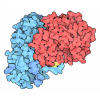
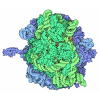
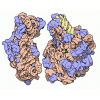
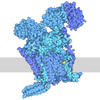

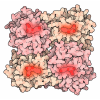




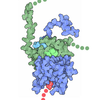
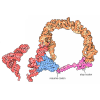
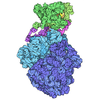
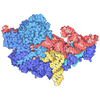

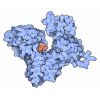



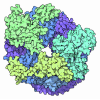


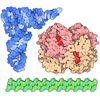
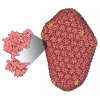
 Z (Sec.)
Z (Sec.) X (Row.)
X (Row.) Y (Col.)
Y (Col.)










